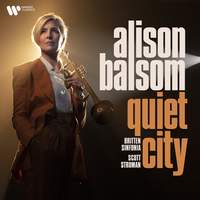Recording of the Week,
Alison Balsom's Quiet City

Alison Balsom is known for two things: an utterly unrivalled mastery of her own instrument, and a career-spanning interest in performing music written for everyone else’s. Her previous highly successful pilferings range from Vivaldi and Bach to Debussy, Satie and Messiaen; for her latest album, Quiet City, she returns from the United States with a sack of equally enjoyable musical loot, aided and abetted by Scott Stroman and the Britten Sinfonia.
The twin centrepieces of this album are Gershwin’s Rhapsody in Blue and the Adagio from Rodrigo’s Concierto de Aranjuez – both firmly established in the canon of classical hits, and both ripe for revisiting and reworking. Simon Wright’s trumpet-centric arrangement of the Rhapsody occupies something of a middle ground between the lushness of the widely-performed orchestral version and the punch of the original for jazz band. Balsom’s delicious rendition of the opening glissando assuages any initial doubts about the wisdom of the arrangement; her effortless, unforced high notes soon make their presence felt, and the sharing of the material between her and pianist Tom Poster in what has effectively become a double concerto feels as natural as if it had always been that way.
It's not just the solo trumpet that enjoys a hugely expanded share of the limelight, though; the whole of the Britten Sinfonia’s trumpet section are put through their paces and acquit themselves admirably. Their powerful tuttis at the top of the instrument’s range are absolutely fearless and committed, in both the Gershwin and the Rodrigo. The former’s yearning romantic sections perhaps feel a little shorn of their usual sentiment; but then again, maybe such indulgent, heart-on-sleeve emotions don’t belong in the glitzy urban brouhaha of early-20th-century America. The latter, in its incarnation by Gil Evans for jazz legend Miles Davis, sees the climaxes crowned by further stratospheric trumpet writing; a kind of American take on the brass band arrangement, used to such powerful effect in the 1996 film Brassed Off.
The Rodrigo adaptation is, perhaps not surprisingly, infused throughout with the spirit of smooth jazz – near-constant drum brushes to begin with, and a string bass underpinning the texture – and in places diverges dramatically from the original. Despite Balsom not having focused on jazz to any great extent in her discography to date, it’s clearly something she has a natural affinity for, with a particularly appealing and at times breathy flugel-like tone in the lower register.
Balsom’s agility in the Rhapsody is remarkable – not just in fast passagework but in huge leaps across the instrument’s range. The price of adapting piano writing for the trumpet! No less beguiling, though, is her expressive, at times weightless, tone in the opening piece – Copland’s magical, atmospheric Quiet City. Its sheer meditative stillness perhaps makes it a more challenging piece to communicate effectively, but between them Balsom, Stroman and cor anglais Nicholas Daniel create something profound.

The same is true of the other quieter piece on the album, Ives’s The Unanswered Question. The trumpet’s simple role here as a recurring motivic representation of the Ultimate Question of Life, the Universe and Everything is the least technically demanding on the album, but drawing together the intentionally disparate elements of this unique work is a tricky task that could spell disaster for an inexperienced conductor. No such problems for Stroman, of course – the hypnotic “silence” of the strings’ slow-moving textures is perfectly offset by Balsom’s persistent questioning and the woodwinds’ scattergun attempts to respond.
Although it looks and feels like a concept album constructed around a theme, this recording doesn’t seem to have been conceived from the outset as a celebration of Americana. Balsom gives the impression in the notes that it almost fell together by accident – but if that’s so then the cohesion she achieves throughout this programme is a minor miracle. From her innate mastery of Copland’s unique language of spacious melancholy to her blend of extroversion and lyricism in the Gershwin and her adept shift into the language of jazz for the Rodrigo, Balsom’s musicianship itself – rather than any reference to a historical moment – is the real unifying thread.
Alison Balsom (trumpet), Britten Sinfonia, Scott Stroman
Available Formats: CD, MP3, FLAC, Hi-Res FLAC



